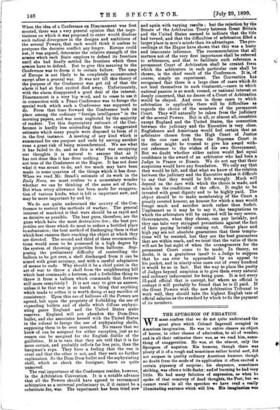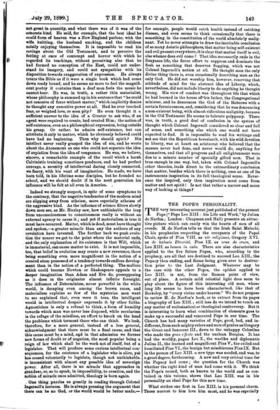THE SPURGEON OF NEGATION.
E must confess that we do not quite understand the
great place which Colonel Ingersoll occupied in American imagination. He was to entire classes an object of horror, to other classes of admiration, to all of wonder, and in all their estimates there was, as we read him, some- thing of exaggeration. He was, at the utmost, only the Spurgeon of negation. His humour, though there was plenty of it of a rough and sometimes rather brutal sort, did not surpass in quality ordinary American humour, though no doubt from the mode of its application it often excited a certain piquancy of surprise ; his eloquence, sometimes striking, was often a trifle flashy; and of learning he had very little. He had many felicities of expression, as when he spoke of that cemetery of dead thoughts, the Past, but we cannot recall in all the speeches we have read a really illuminating sentence which will live. His imagination was not great in quantity, and what there was of it was of the cohcrete kind. He said, for example, that the best ideal he could form of heaven was a New England parlour, with the wife knitting, the husband smoking, and the children noisily enjoying themselves. It is impossible to read his ravings about the Old Testament, and to perceive the feeling at once of contempt and horror with which he regarded its teachings, without perceiving also that he had formed no conception of the East, could not under- stand its imagery, and could not sympathise with its disposition towards exaggeration of expression. He always treats' the Bible as if it were a single book which had come down ready bound, and be seems no more to feel the magnifi- cent poetry it contains than a deaf man feels the music he cannot hear. He was, in truth, a rather thin materialist, whose philosophy is summed up in his sentence that " he could not conceive of force without matter," which implicitly denies to thought any executive power at all. Had he ever touched fear, or weighed love, or seen pity ? He even thought it a sufficient answer to the idea of a Creator to ask who, if an agent were required to create, had created Him; the notion of self-existence, even as a philosophical expression, being outside his grasp. Or rather, he admits self-existence, but can attribute it only to matter, which he obviously believed could have had no beginning. Then why should spirit? His intellect never really grasped the idea of sin, and he wrote about the Atonement as one who could not separate the idea of expiation from the idea of vengeance. He was, we believe, sincere, a remarkable example of the recoil which a harsh Calvinistic training sometimes produces, and he had perfect courage, a serenity of intellectual daring closely connected, we fancy, with his want of imagination. He made, we have been told, in his lifetime some disciples, but he founded no school, and we should doubt if in the next generation his influence will be felt at all even in America. .
Indeed we strongly suspect, in spite of some symptoms to the contrary, that the negative tendencies of the modern mind are slipping away from atheism, more especially atheism of the aggressive kind. As the influence of science filters slowly down men see, as Mr. Huxley saw, how unthinkable the leap from unconsciousness to consciousness really is without an external agency to cause it ; and yet if materialism is true it must have occurred. Matter, which is dead, must have thought and spoken,—a greater miracle than any the authors of any revelation have invented. The further back we push evolu- tion the nearer we get to the point where the material ends, and the, only explanation of its existence is that Will, which is immaterial, can cause matter to exist. It is not impossible, too, that belief in evolution may create a new reverence, there being' something even more magnificent in the notion of a created atom possessed of a tendency towards endless develop- ment than in the notion of a perfected thing. The mollusc which could become Newton or Shakespeare appeals to a deeper imagination than Adam and Eve do, presupposing as it does in the originator almost infinite foresight. The influence of Determinism, never powerful in the white world,• is decaying even among the brown races, and materialism explains so few of the mysteries men want to see explained that, even were it true, the intelligent would in intellectual despair supersede it by other faiths. Agnosticism is only a refusal to think, a form of humility towards which man was never less disposed, while secularism is the refuge of the mindless, an effort to knock on the head the problems which torment those who can think. We look, therefore, for a more general, instead of a less general, ac. knowledgment that there must be a final cause, and that this cause must be a mind, goad in that admission we foresee new forms of doubt or of negation, the most popular being a reign of law which shall be the work not of itself, but of a legislator. That will produce some curious intellectual cow sequences, for the existence of a legislator who is alive, yet has ceased voluntarily to legislate, though not unthinkable, is inconsistent with almost any possible idea of sovereign power. After all, there is no miracle that, approaches in grandeur, or, so to speak, in impossibility, to creation, and the notion of miracle once admitted, theology is born again.
One thing _puzzles us greatly in reading through Colonel Ingersoll's lectures. He is always pressing the argument that there can be no God, or the world would be better made,— for example, people would catch health instead of catching disease, and even seems to think occasionally that there is something in the constitution of the world absolutely malig- nant. Yet he never attempts to draw the inevitable conclusion of so many Asiatic philosophers, that matter being self-existent and evil present everywhere, it is clear that matter itself is evil, else whence does evil come ? That idea necessarily ends in the Sunyasee life, the fierce effort to suppress and dominate the flesh as something that deserves flogging, which was not Colonel Ingersoll's notion at all. He thought man the only divine thing there is, even occasionally describing man as the only God. He did not worship him, however, reserving that attitude of mind for the abstract idea of Liberty, which, nevertheless, did not include liberty to do anything he thought wrong. His view of conduct was throughout life that which he had learned in the house of•his father, the Congregational minister, and he denounces the God of the Hebrews with a certain ferociousness, and, considering that he was denouncing a non-existent being, with almost ridiculous malignity, because in the Old Testament He seems to tolerate polygamy. There was, in truth, a good deal of confusion in the system of thought which Colonel Ingersoll considered so clear and full of sense, and something else which one would not have expected to find. It is impossible to read his writings and not see that the Republican heresiarch, with his wild devotion to liberty, was at heart an aristocrat who believed that the masses never had done, and never would do, anything for themselves, and that all progress and all enlightenment were due to a minute number of specially gifted men. That is true enough in one way, but, taken with Colonel Ingersoll's other theories, leads direct to the extraordinary conclusion that matter, besides which there is nothing, uses as one of its instruments inspiration in its full theological sense. Rever- ence the inspired, only then inspiration must come from matter and not spirit I Is not that rather a narrow and mean way of looking at things P



































 Previous page
Previous page